Javatrekker
Air Date: Week of October 19, 2007
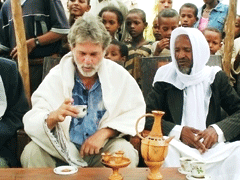
(Courtesy of Dean Cycon)
Dean Cycon believes coffee farmers should receive a living wage and has traveled the world to help build the fair trade movement. Cycon imports and sells coffee under the name “Dean’s Beans” and recently wrote a book about his adventures in the coffee trade called “Javatrekker: Dispatches from the World of Fair Trade Coffee.” He joins host Steve Curwood.
Transcript
[WOMAN SAYS ‘CAN I GET A MEDIUM LATTE PLEASE?’ SOUNDS OF CASH REGISTER, MILK BEING STEAMED, PEOPLE TALKING]
CURWOOD: A latte at a coffee bar can cost three or four bucks and almost none of that money gets back to the coffee grower. Indeed, a close look at farmers the world over finds that most of them get poverty-level prices for their crops. And many also run the risk of cancer and other health problems associated with farm chemicals. To change this dynamic the fair-trade coffee movement began. Fair-trade coffee merchants pay better prices by dealing directly with growers instead of middlemen, and by encouraging the production of premium organic coffee.
Dean Cycon helped to build the fair-trade coffee movement. He imports and sells coffee under his brand Dean’s Beans and has just written a book about his adventures in the coffee trade entitled “Javatrekker: Dispatches from the World of Fair Trade Coffee.” Dean, how did you become interested in coffee?
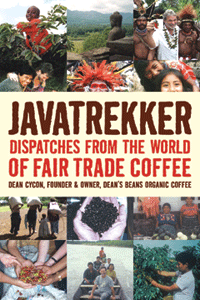
"Javatrekker: Dispatches from the World of Fair Trade Coffee", by Dean Cycon (Courtesy of Chelsea Green Publishing)
CURWOOD: So what you’re saying is that you would raise some money from coffee companies and you’d put in a well or a school or a clinic or something?
CYCON: Exactly. Which is great, but I thought—what would it look like if the companies paid the people enough so that they could make their own development decisions and pay for their own well if they wanted it. What would that look like?
CURWOOD: Now, as I understand it, the coffee plant can maybe only use about 20 or 30 percent of a day’s worth of sunlight—that if it’s out in the sun all day long it’s not actually good for it.
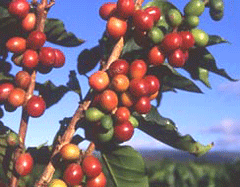
Coffee cherries growing. (Courtesy of the State of Hawaii)
CURWOOD: So, the world is changing in particular, in terms of climate. What’s the effect of global warming been on coffee around the world?
CYCON: Well you know not too many people have looked into that but in February I was in Colombia in particular to look at the impact of global warming on coffee. In this one area in Colombia they believe that they are the elder brothers and their job is to hold the world together so they’re very, very sensitive to ecological change. What they taught me there, is that as the world heats up, the upper mountains are drying up. So what that means is that the water from glacial melt doesn’t make it down the mountain. That means that the nutrients in the soils on top of those mountains, the minerals, don’t make it down. So the soil becomes less coherent down below.
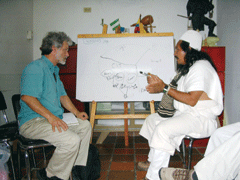
An Arhuako tribal leader in Columbia explains to Dean how climate change is affecting the Sierra Nevada Mountains and the coffee they grow there.
(Courtesy of Dean Cycon)
CURWOOD: Now you’ve traveled to just about every place where people grow coffee. And one of the places I was surprised to hear there’s coffee from was Papua New Guinea.
CYCON: Papua New Guinea is probably one of the most remote places in the world. When I was getting ready to go to Papua New Guinea I couldn’t find anybody who’d ever been there. And, coffee was only introduced to Papua New Guinea like 60 years ago. They took the coffee there and had no problems growing it. Unfortunately, the farmers don’t have access to information on how to process it well. Papua New Guinea is the only place in the world where people take handfuls of coffee, put them on river stones and smash them to get the beans out, as opposed to processing them in machinery and so it’s very uneven. So that coffee can be one of the world’s best, which would change the economics of Papua New Guinea tremendously—if they only got a little technical help, which is one of the things we’re doing there.
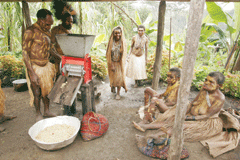
This simple depulper immediately increased the quality and value of the coffee produced by these farmers in Papua New Guinea. (Courtesy of Dean Cycon)
CYCON: Well I was the first white guy to go up into those mountains since the Australian soldiers were there in World War II, which means that the overwhelming majority of the population, which is younger than World War II, had never met a Caucasian, had never met an American, certainly, and had never met anybody who could say something about the quality of and how hey grow their coffee. So my visit set off a furor. I went to one village and there were over a thousand people in traditional dress. I know traditional dress is mostly what they wear but I’m talking about boar tusks through their nose and six-foot-tall feather head sets, the women were only wearing grass skirts and were covered with pig fat and ash, and they were in a mood to celebrate. The next place we went to we were met by 8,000 people in tribal dress and they were going ballistic. And so I got a chance to speak to them and work a lot and they had celebrations showing how to grow coffee and beating the robbers who come and steal the coffee. There were morality plays. It was mind blowing. I’d never had an experience like it in my life.
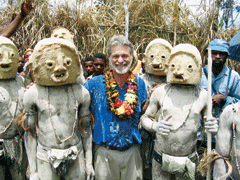
The Asaro Mudmen in Simbu Province welcome Dean to Papua New Guinea.(Courtesy of Dean Cycon)
CYCON: Well I try to learn enough of the language, the indigenous languages when I go someplace, to show respect. And people really appreciate it if I can say even a few words. So I learned how to say—how to start my speeches off in Tok Pisin and how to close them, and the rest I gave in English and was translated. So, in front of 8,000 people I said ‘appaninchru omerin omanblono papua new guinea,’ which means ‘good afternoon, all men and women of Papua New Guinea.’ And then I gave my speech in English and at the end I ended with a flourish by saying ‘now my speech is finished.’ And I said now, ‘now, me talk talk penis.’ And the guy next to me said, the translator said, ‘ah.’ And I looked and the crowd wasn’t cheering they were staring at me intently. And he said ‘you just said, now I’m going to talk about my penis.’ And I said, ‘I thought I said finished!’ And he said ‘no, that’s penis, you pronounced it wrong.’ And I said ‘what do I do now?’ He said, ‘well you’ve got two choices: you can show them your penis because they’ve never seen a white man’s penis and a lot of people are very interested, or you can close the talk.’ I said ‘maybe after dinner, I’m not quite ready to do that.’ So he told the crowd that I actually meant that the talk was finished and I got a good round of applause but there were a lot of disappointed looks in the crowd.

Dean Cycon takes part in a coffee ceremony with an Oromo elder at the Haro Cooperative in Jimma, Ethiopia. (Courtesy of Dean Cycon)
CYCON: Sure. I went to the Specialty Coffee Association International Trade Show, happens every year. There are always small farmers from around the world coming there. They walk the convention centers with these little zip lock bags full of their coffee and they walk up to the buyers and say, ‘Please, sir. Would you try our coffee?’ Most people in the coffee industry say ‘oh yes, I’m sure this will be just fine’ and then leave it in their hotel room. Well, I met Esperanza and several of the folks from her co-op and I said, ‘well I only buy organics’ and she said, ‘well, we’re certified organic’ and I said ‘oh, I only buy fair trade.’ And she said ‘Well we’ve been on the fair-trade register for three years but we’ve never had a sale.’
So I took that coffee and I made a deal with a broker in California. Well the farmers were ecstatic. And it was their first fair-trade sale. I went to Peru, shortly thereafter, to celebrate it. And they showed me all the wonderful things they were doing and what they planned on doing with the fair-trade money. Over the next three years, what’s happened with that cooperative is it’s gone from producing three containers of coffee to producing 14. The economic difference it’s made in their community is staggering. They’ve taken the fair-trade premiums, distributed much to the people, but also pooled it to create a women’s loan fund so that women, for the first time in history, are getting access to credit. And I’ve got to tell you, the first woman took the loan to put her son in university, the first kid from this co-op to go to university. Other people have started stores and small businesses and it’s making an economic spin-off, a big difference.
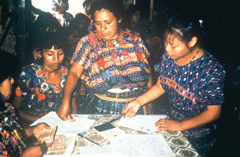
In Guatemala, Julia uses her thumbprint to sign a loan agreement, her first access to credit.
(Courtesy of Dean Cycon)
The indigenous group I worked with there—the Ashaninkas—used the money to create a reforestation program to reforest their sacred lands which had been deforested in the 70s by illegal colonization. So, profound difference. Now, three years later—Esperanza, who when I first met her is a meek, quiet little woman from Latin America. Now I take her to the New York State Teachers Union conference last year in Rochester—3500 school teachers and Hillary Clinton’s the keynote speaker. Esperanza gets up and delivers an impassioned, educated, convincing talk about fair trade. The union votes to support fair-trade coffee. Esperanza gets a standing ovation. The next speaker is Hillary Clinton—makes a great speech and gets very polite applause. (laughs) So, that’s what’s happened to Esperanza in the last few years—she’s become quite the international spokesperson for fair trade.
CURWOOD: Dean Cycon’s book is called “Javatrekkers: Dispatches from the World of Fair Trade Coffee.” He’s the founder and owner of Dean’s Beans Organic Fair Trade Coffee. Thank you so much, sir.
CYCON: Thank you, Steve.
[MUSIC: Juan Luis Guerra Y 440 “Ojala Que Llueva Café” from Grandes Exitos (Karen Publishing—2000)]
Links
Living on Earth wants to hear from you!
Living on Earth
62 Calef Highway, Suite 212
Lee, NH 03861
Telephone: 617-287-4121
E-mail: comments@loe.org
Newsletter [Click here]
Donate to Living on Earth!
Living on Earth is an independent media program and relies entirely on contributions from listeners and institutions supporting public service. Please donate now to preserve an independent environmental voice.
NewsletterLiving on Earth offers a weekly delivery of the show's rundown to your mailbox. Sign up for our newsletter today!
 Sailors For The Sea: Be the change you want to sea.
Sailors For The Sea: Be the change you want to sea.
 The Grantham Foundation for the Protection of the Environment: Committed to protecting and improving the health of the global environment.
The Grantham Foundation for the Protection of the Environment: Committed to protecting and improving the health of the global environment.
 Contribute to Living on Earth and receive, as our gift to you, an archival print of one of Mark Seth Lender's extraordinary wildlife photographs. Follow the link to see Mark's current collection of photographs.
Contribute to Living on Earth and receive, as our gift to you, an archival print of one of Mark Seth Lender's extraordinary wildlife photographs. Follow the link to see Mark's current collection of photographs.
 Buy a signed copy of Mark Seth Lender's book Smeagull the Seagull & support Living on Earth
Buy a signed copy of Mark Seth Lender's book Smeagull the Seagull & support Living on Earth

